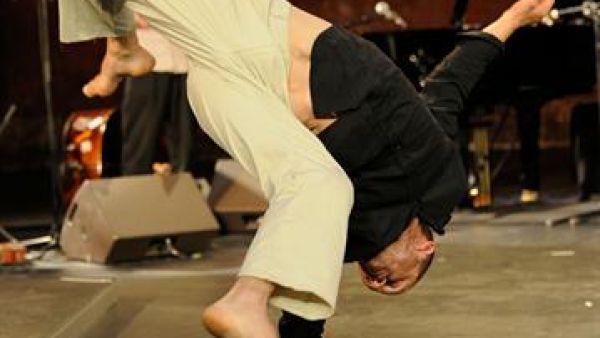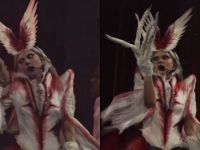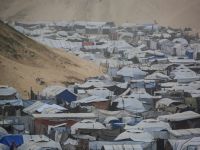Managed by Blaise Merlin, a troupe of musicians, actors and dancers will invade the French Institute’s “Espace des Lettres” at the end of the week. “La Voix est Libre – Jazz Nomades” gathers 13 artists either from or based in France.
Part of the “Francophone Month,” organized by the French Institute, this two-day event will present a wide selection of artistic sessions. The Daily Star talked to Merlin to find out more about his project.
Q: When was “Jazz Nomades” founded?
A: It was founded in 2002. But for years before that I used to organize at least 20 concerts [annually] in Paris in a place known for its emerging talents, with artists who came from all around the world: from Africa, from the East and Middle East.
Historically, the festival was called “Jazz Nomades,” but since 2005 it is called “La Voix est Libre” (The Voice is Free). But we kept “Jazz Nomades” as a second title, which combines the improvisation facet, with many transcultural and transmusical encounters.
“La Voix est Libre” became a festival that is producing sense out of different cultures through voice, poetry, theater and even sciences. This year, scientists will talk about diversity through genetics and astrophysics. ... This is what we have in the festival: the encounter between different universes.
Q: Are there themes or do artists have the choice to tackle whatever theme they want?
A: In general, themes just emerge by themselves each year. In Paris in 2007, for example, there was the subject of national identity which we used the other way round. We showed that the logic of identity was a trap.
There is one theme which is always present in the festival – it is the one of unity through diversity. I think it is the same in Beirut. What I think is beautiful in Beirut is this freedom of expression that has always prevailed regarding all the confrontations and wars. It is a city with problems but also with a huge sense of resistance. [A city] with important values ... My role is to bring the most beautiful and touching from the young generations of artists, who break all these barriers.
Q: Since it is your first time in Beirut, what do you expect from your stay here?
A: I expect nice encounters with the audience and surprises. I expect to be as surprised as the spectators. Nobody knows exactly how everything will happen with the audience, with the energy of the people and the city. Improvisation plays an important part.
There is a duo that we will create here and bring to Paris: the actress Frederique Bruyas and Elise Dabrowski, a jazz cellist and cantatrice who improvises a lot. It is really impressive. She will accompany Bruyas who will read poems by women from the Middle East and Africa.
Q: How do you choose which artists will perform?
A: Some artists are emblematic [of the festival.] I tried to bring la crème de la crème of French musicians. We are [anchored] in openness, travel and encounters. So it is often the same artists who come back but always through different encounters. They are artists who give everything and who are very sincere. They can have a [lot of] artistic control, but can also let everything go and be carried away by the others.
This is what I like. An artist is here to create something, to say something and we immediately feel he/she has his/her own language.
Q: How will the two evenings unfold? Can you tell us a bit more about this year’s performers?
A: It is like being in a cabaret. The idea is for everyone to form [their] own path and live it freely. It is a festival which gives a lot of freedom, where the spectators are curious [about] meeting the artist afterward.
... The first night [Friday] is entitled “Les Indomptables” (The Indomitables). ... They are people who come with their own baggage. There is this hip-hop dancer [for instance] who is also a modern dancer. His name is Mathieu Desseigne.
... The first night [consists of] 20-minute shows, a bit like a cabaret. It is principally duos, in which the performers have to be focused. We have the duo Frederique Bruyas and Elise Dabrowski. Then, a dance and saxophone duo with Peter Corser. ... There is Mathieu Desseigne – who is [actually] one of Alain Platel’s [renowned Belgian choreographer and stage director] favorites. [Desseigne] loves to improvise and work on very physical acts. It is a corporal and musical trance.
We will change the ambiance with Elise Caron and Edward Perraud. [Caron] is an actress and jazz singer. Their show will go in many directions: poetry, humor and groove. Perraud is one of the most famous drummers in France and in the U.S. When I said that we had la crème de la crème, it wasn’t a lie. And we will finish [the first evening] with Fantazio, he is really something. He’s probably among the top 10 artists of these last 10 years. He sings in five languages, plays cello and banjo. He is a character of contemporary cabaret. He will also be part of the aftershow at Metro al-Madina.
The second evening will consist [of] concerts. Elise Dabrowski will perform again but solo this time. It will be a free expression of her art, from jazz to opera and songs from the East. And this evening will end on a trio called “Forabandit,” a dialogue between the Middle East and the south of France. ... It is a collaboration between a modern troubadour, Sam Karpienia, with another Trukish troubadour, Ulas Ozdemir, and Iranian percussionist Bijan Chemirani will do the rhythmical liaison between both singers and cultures.
“La Voix est Libre – Jazz Nomades” will perform on March 22-23 at the French Institute. For more information, please call 01-420-234 or visit www.20mars.francophonie.org and www.jazznomades.net.








